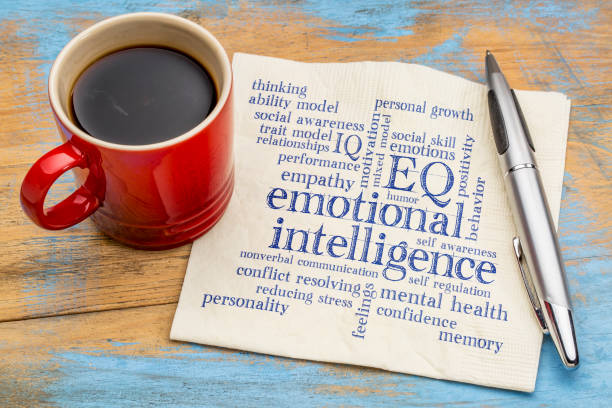A Comprehensive Guide to Enhancing Your EQ
Aug 16, 2023 By Madison Evans
Do you want to improve your emotional intelligence (EQ) and unleash your potential? Developing a strong EQ is key to forming relationships, success in the workplace, and self-actualization. A high EQ can even improve physical health outcomes from better stress management to improved sleep quality. In this comprehensive guide, we will walk you through the fundamentals of developing a higher EQ so that you can harness the power of emotions in furthering both professional and life goals alike. Read on for our top tips and tricks on enhancing all aspects of your emotional intelligence!
Understand the fundamentals of emotional intelligence (EQ):
Emotional intelligence (EQ) is the ability to recognize, understand, and manage emotions. The concept of EQ is relatively new but it has become very popular in recent years as more people are realizing its importance. EQ involves recognizing one’s own feelings and the feelings of others, understanding why they feel that way, and using this information to make sound decisions in any given situation.
Having a high EQ allows you to stay calm and composed even in stressful situations, take feedback positively, have empathy for others, maintain meaningful relationships, be mindful of your impact on the environment, and so much more. Developing strong emotional intelligence is essential for anyone looking to make an impression and unlock their full potential.
Identify and manage your emotions in healthy ways:

The first step in developing strong EQ is to identify and manage your emotions in healthy ways. This means understanding the different types of emotions that you experience, recognizing which situations or topics trigger certain feelings, and finding ways to control them without resorting to unhealthy coping mechanisms like alcohol or drugs.
One way to start managing your emotions is to practice emotional regulation techniques such as deep breathing, progressive muscle relaxation, and meditation. You can also start journaling to get a better sense of what triggers you and how your emotions impact the way you interact with people. Lastly, learning mindfulness is key for recognizing your thoughts and feelings without becoming overwhelmed or judging yourself.
Develop empathy in order to create meaningful connections:
Empathy is a key component of emotional intelligence and one that is often overlooked. Being empathetic requires being aware of how others feel without judging them or taking it personally. It also means actively listening and understanding someone’s point of view, even if it differs from your own.
Developing strong empathy skills can help you create meaningful connections with others, which is key for networking, forming friendships, and building a support system. It also helps foster trust in professional relationships so that you are better able to collaborate and work towards common goals.
Recognize and understand the feelings of others:
In order to be successful in any career or relationship, you must possess an understanding of how other people feel. This means being able to recognize the emotions that someone is displaying and why they are feeling that way in a given situation. It also involves being aware of their body language and tone of voice so that you can accurately assess the feelings behind what they’re saying. By gaining a better understanding of how other people feel, you can better connect with them and anticipate their needs. This makes it easier to collaborate on projects, resolve conflicts in a healthy way, and maintain lasting relationships.
Make sound decisions based on emotional cues:

Having strong emotional intelligence means that you can make sound decisions based on your understanding of both your own feelings and those of others. This involves understanding the motivations behind why someone behaves in a certain way or makes a particular decision, as well as being aware of how your words and actions will be perceived by other people.
By having a better understanding of emotions, you will be better equipped to make decisions that are in everyone’s best interest and ensure that both parties feel heard and respected. This can also help prevent potential conflicts from escalating into something bigger and more damaging.
Use your emotional intelligence to achieve personal goals:
Having a strong EQ is essential for anyone looking to further their career, build meaningful relationships, and achieve their personal goals. It allows you to recognize and manage your own emotions in healthy ways so that you can stay composed in stressful situations. It also gives you the ability to understand the feelings of others and use this understanding to create meaningful connections. Finally, it equips you with the skills necessary for making sound decisions based on both logic and emotion. By developing your emotional intelligence, you will be able to better navigate the professional and social landscape to unlock both personal and career opportunities. With a higher EQ, you can reach your full potential and achieve the success that you desire.
Developing strong emotional intelligence takes time and practice:
Developing strong emotional intelligence takes time and effort. It requires an understanding of both your own and other people’s emotions, as well as the ability to manage them in healthy ways. The key is to be patient with yourself and practice every day in order to build strong EQ skills. With a little bit of dedication, you will start noticing positive changes in your relationships both at home and at work, and you will be able to achieve your goals with greater ease.
Conclusion:
Emotional intelligence is an essential skill for anyone looking to make an impression and unlock their full potential. By developing your EQ, you can recognize and manage your emotions in healthy ways, develop empathy in order to create meaningful connections, understand the feelings of others, make sound decisions based on emotional cues, and use this knowledge to achieve personal goals with greater ease. Developing strong EQ takes time and effort, but with a little bit of dedication, you can start noticing positive changes in your interactions with others. By investing in yourself and honing your emotional intelligence skills, you will be able to unlock unlimited opportunities for success.
FAQs:
What is emotional intelligence?
Emotional intelligence (EQ) is the ability to recognize and manage your own emotions in healthy ways, understand the feelings of others, and use this knowledge to make sound decisions based on both logic and emotion. It involves being aware of how other people feel without judging them or taking it personally, as well as actively listening and understanding someone’s point of view.
How can I develop my emotional intelligence?
Developing strong EQ skills takes time and effort, but there are a few key things you can do to get started: practice emotional regulation techniques such as deep breathing, progressive muscle relaxation, and meditation; start journaling to get a better sense of what triggers your emotions; and practice active listening and empathy to build meaningful connections with others. With a little bit of dedication, you will start noticing positive changes in both your personal and professional life.
What are the benefits of emotional intelligence?
Developing strong EQ skills has many benefits, including being better able to recognize and manage your own emotions in healthy ways, understanding the feelings of others and forming meaningful connections with them, making sound decisions based on emotional cues, and achieving your personal goals with greater ease. It can also help you get ahead in your career and lead to long-term success.
-
 Nov 27, 2023
Nov 27, 2023Lentils Benefits, Nutrition Value, Health, and How to Cook Them
There are many nutritional lentils benefits as they are a rich source of protein and fiber that play a crucial role in preventing degenerative diseases.
-
 Sep 18, 2023
Sep 18, 2023What Are Allergies? Exploring the World of Allergic Reactions
Explore the diverse world of allergies, understand common symptoms, causes, and effective management strategies with our comprehensive guide. Get a grasp on your sneezes!
-
 Jan 07, 2023
Jan 07, 2023How Can You Tell If You Have A Stomach Ulcer?
An ulcer forms in the stomach or small intestine lining, causing pain and discomfort. Abdominal discomfort, nausea, vomiting, bloating, loss of appetite, and heartburn are all symptoms. Bleeding is a potentially fatal complication of a stomach ulcer. Going to a doctor for a diagnosis and treatment is essential if you think you have a stomach ulcer.
-
 Nov 27, 2023
Nov 27, 2023A Fitness Guide: What Exercises You Should Do At Your Desk While Working
Are you tired of being sitting all day at the desk? Here are some exercises which will make you feel relaxed and fit during the hectic routine.
